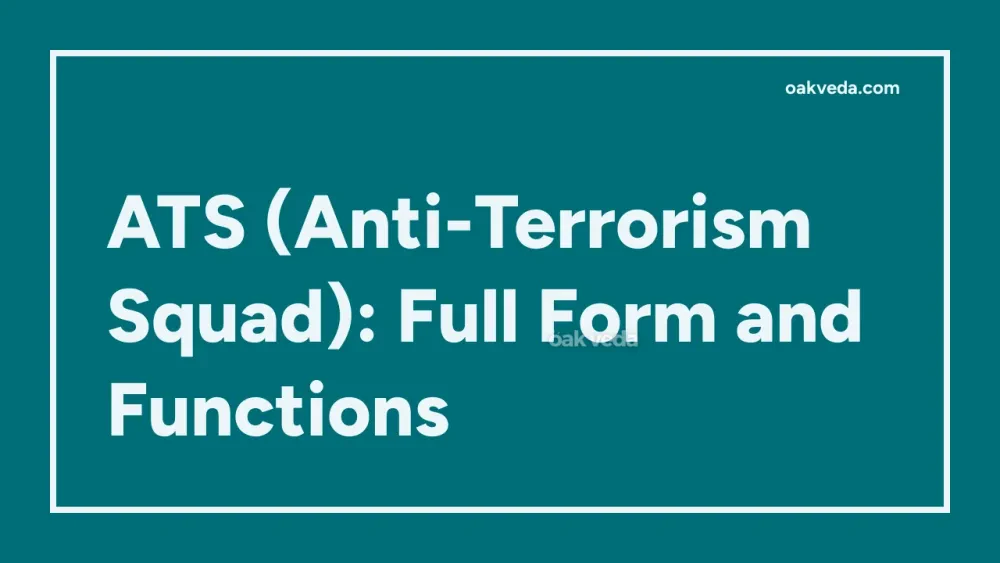
What is the Full Form of ATS?
The full form of ATS is Anti-Terrorism Squad. This specialized police unit operates in various Indian states, including Maharashtra, Uttar Pradesh, Rajasthan, Kerala, Gujarat, West Bengal, and Bihar. The ATS is a crucial component of India's counter-terrorism efforts, focusing on preventing and combating terrorist activities within the country.
What is Anti-Terrorism Squad?
The Anti-Terrorism Squad is an elite police task force dedicated to countering terrorism and related threats to national security. Guided by senior Indian Police Service (IPS) officers, the ATS plays a vital role in gathering intelligence, investigating terrorist activities, and neutralizing potential threats. The squad has been instrumental in thwarting numerous terror plots and maintaining public safety across India.
Origin and Development of Anti-Terrorism Squad
The concept of the Anti-Terrorism Squad in India has its roots in the late 1980s:
- Established in 1989 in Maharashtra by then Additional Commissioner of Mumbai Police, Aftab Ahmed Khan (A.A. Khan)
- Inspired by the Special Weapons And Tactics (SWAT) teams of the Los Angeles Police Department
- Gained prominence after successfully tackling various terrorist incidents and organized crime
Since its inception, the ATS has evolved significantly, adapting to the changing nature of terrorism and expanding its operations to multiple states across India.
How does the Anti-Terrorism Squad work?
The Anti-Terrorism Squad operates through a combination of intelligence gathering, strategic planning, and tactical operations. Key aspects of its functioning include:
- Intelligence Network: Developing and maintaining a robust network of informants and sources
- Coordination: Collaborating with other intelligence agencies like the Intelligence Bureau (IB) and Research and Analysis Wing (RAW)
- Surveillance: Monitoring potential threats and suspicious activities
- Rapid Response: Deploying specially trained personnel for swift action during terrorist incidents
- Investigation: Conducting thorough inquiries into terrorist activities and related crimes
Functions of Anti-Terrorism Squad
The primary responsibilities of the ATS encompass a wide range of counter-terrorism activities:
- Intelligence Gathering: Collecting and analyzing information on anti-national elements and potential threats
- Threat Assessment: Evaluating the credibility and severity of terrorist threats
- Counter-Terrorism Operations: Planning and executing operations to neutralize terrorist cells and prevent attacks
- Crime Prevention: Monitoring and eliminating activities of terrorist organizations, mafias, and organized crime syndicates
- Financial Crime: Detecting and disrupting fake currency rackets and narcotics trafficking
- Hostage Rescue: Conducting specialized operations to rescue hostages during terrorist incidents
- Training: Providing advanced training to law enforcement personnel in counter-terrorism techniques
Applications of Anti-Terrorism Squad
The ATS has been involved in numerous high-profile cases and operations, demonstrating its crucial role in India's national security:
- 26/11 Mumbai Attacks: The Mumbai ATS played a significant role in the hostage rescue operations during the 2008 terrorist attacks, including at the Taj and Trident hotels
- Malegaon Blast Case: Investigation of the 2008 Malegaon bombing in Maharashtra
- German Bakery Blast: Probe into the 2010 Pune bombing at the German Bakery
- Cyber Terrorism: Tackling cases of online radicalization and cyber-enabled terrorism
Features of Anti-Terrorism Squad
The ATS is characterized by several unique features that set it apart from regular police units:
- Specialized Training: Officers undergo rigorous training in counter-terrorism tactics and intelligence gathering
- Advanced Equipment: Access to state-of-the-art weapons, surveillance technology, and forensic tools
- Inter-Agency Cooperation: Strong collaboration with national and international security agencies
- Rapid Deployment: Ability to quickly mobilize and respond to terrorist threats or incidents
- Undercover Operations: Capability to conduct covert operations to infiltrate and dismantle terrorist networks
Benefits of Anti-Terrorism Squad
The existence of the ATS provides numerous advantages to India's counter-terrorism efforts:
- Enhanced national security through proactive threat prevention
- Improved coordination among various law enforcement and intelligence agencies
- Specialized expertise in handling complex terrorist situations
- Deterrent effect on potential terrorists and organized crime syndicates
- Faster response times to terrorist incidents, potentially saving lives
Limitations or Challenges of Anti-Terrorism Squad
Despite its successes, the ATS faces several challenges in its operations:
- Evolving nature of terrorism, including cyber-terrorism and lone-wolf attacks
- Balancing security measures with civil liberties and privacy concerns
- Resource constraints and the need for continuous technological upgrades
- Jurisdictional issues when operating across state boundaries
- Potential for political interference in high-profile cases
Future Developments in Anti-Terrorism Squad Technology
As terrorism evolves, so must the ATS. Future developments may include:
- Enhanced use of artificial intelligence and machine learning for threat prediction
- Improved cyber-intelligence capabilities to combat online radicalization
- Integration of advanced biometric systems for suspect identification
- Deployment of cutting-edge non-lethal weapons for hostage situations
- Increased use of drones and robotics in high-risk operations
FAQs on ATS Full Form
-
What is the full form of ATS in police? The full form of ATS in police is Anti-Terrorism Squad.
-
When was the first ATS established in India? The first ATS was established in Maharashtra in 1989.
-
Who founded the Anti-Terrorism Squad? The ATS was founded by Aftab Ahmed Khan, then Additional Commissioner of Mumbai Police.
-
In which states does the ATS operate? The ATS operates in several Indian states, including Maharashtra, Uttar Pradesh, Rajasthan, Kerala, Gujarat, West Bengal, and Bihar.
-
What are the main functions of the ATS? The main functions of the ATS include intelligence gathering, counter-terrorism operations, threat assessment, and investigating terrorist activities.
The Anti-Terrorism Squad continues to play a crucial role in India's fight against terrorism, adapting to new challenges and evolving threats to ensure the safety and security of the nation.
You may be interested in:

